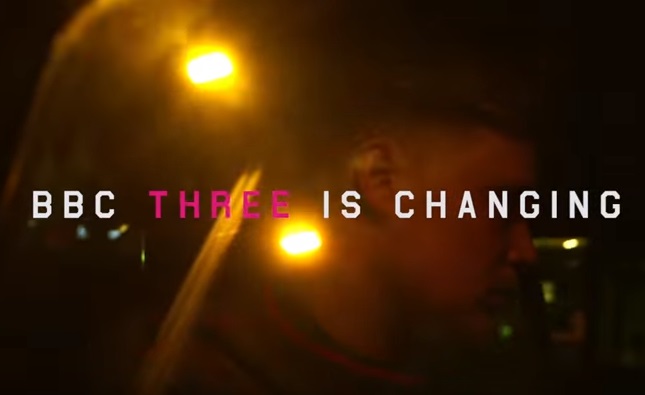BBC Three has broadcast its final night on UK TV, as the youth-oriented channel goes online only.
Programmes and other content such as animations and short films will now be available via the channel’s website and the BBC iPlayer. Shows will also be broadcast on BBC 1 and BBC 2, although scheduling has not been confirmed.
The move could lead to a 80% drop in viewers the broadcaster’s governing body has said.
A financially motivated proposal to move the channel online to BBC iPlayer was provisionally approved by the BBC Trust in June 2015, and its fate has now been formally sealed.
The move will free up around £30 million a year, which the corporation has said it will put into its drama budget.
But a public value assessment (PVA) found that 80% of the “uniquely reached” BBC Three audience would “simply be lost”. BBC Three currently has a unique audience of around 975,000.
The PVA also found that the move offered low value for money because of the smaller audience, but recognised that the closure would generate a net saving of £30 million per annum to offset financial pressures or for investment in other areas.
Damian Kavanagh, the controller of BBC Three, said that more than half of all video content watched by 16-24 year olds is no longer in the form of live television, and that the plans spelt “exciting times for BBC Three”.
He said: “BBC Three is not closing, we are reinventing online. We will not be a scheduled 7pm to 4am linear broadcast TV channel but we will be everywhere else giving you the freedom to choose what to watch when you want.
Social media rebirth?
As part of BBC Three’s rebirth, it’ll further embrace new media, with its YouTube channel and social network activity becoming more important outlets for content. See the channels’s new YouTube announcneemnt below:
BBC Three first began broadcasting in 2003, in an effort to keep younger viewers interested in the BBC when they had grown out of children’s programming on CBBC.
The experiment cost more than £1billion over 13 years, but the BBC decided to pull the plug in order to cut costs. The channel’s budget will shrink from around £85million.
BBC1 and BBC2 have already shown some BBC3 shows in the past – with varying degrees of success.
The BBC will still spend £25m a year on content, but the programmes will only be shown online and on the broadcaster’s more ‘grown up’ channels.
The network has already posted a video from its YouTube account welcoming viewers to the new platforms.
The move to online was first proposed in 2014 and was approved by the BBC Trust in November.
The Trust said there was “clear public value in moving BBC Three online, as independent evidence shows younger audiences are watching more online and watching less linear TV”.
The channel, which targets 16 to 34 year olds and became notorious for shows like ‘Snog, Marry Avoid’.
Gavin and Stacey started life on BBC3 before becoming a major BBC1 hit, and boosting the career of its star James Cordon, who sent a special message to the channel via his US chat show (see below).
Who better to introduce Gavin and Stacey than the one and only @JKCorden? *salutes*https://t.co/D81OaiVrfH
— BBC Three (@bbcthree) February 15, 2016
Popular reality show Don’t Tell the Bride was also a BBC3 series before moving to BBC1 last July. However, that union was not so happy, and the series will move to Sky 1 in the summer.
BBC1 audiences have an average age of 59, whilst BBC2 viewers tipped over the 60 threshold for the first time last year, according to official figures.

